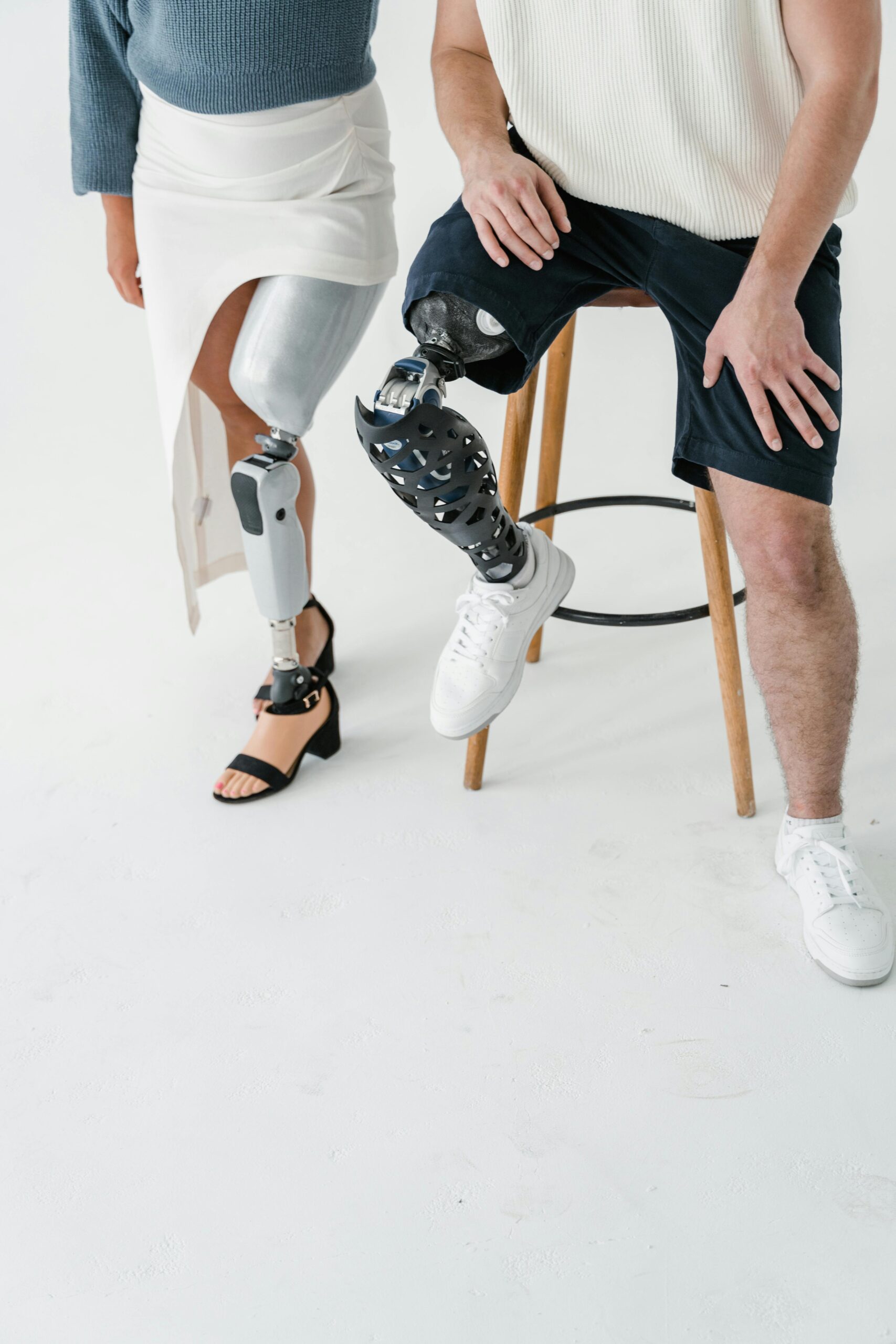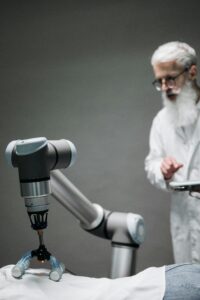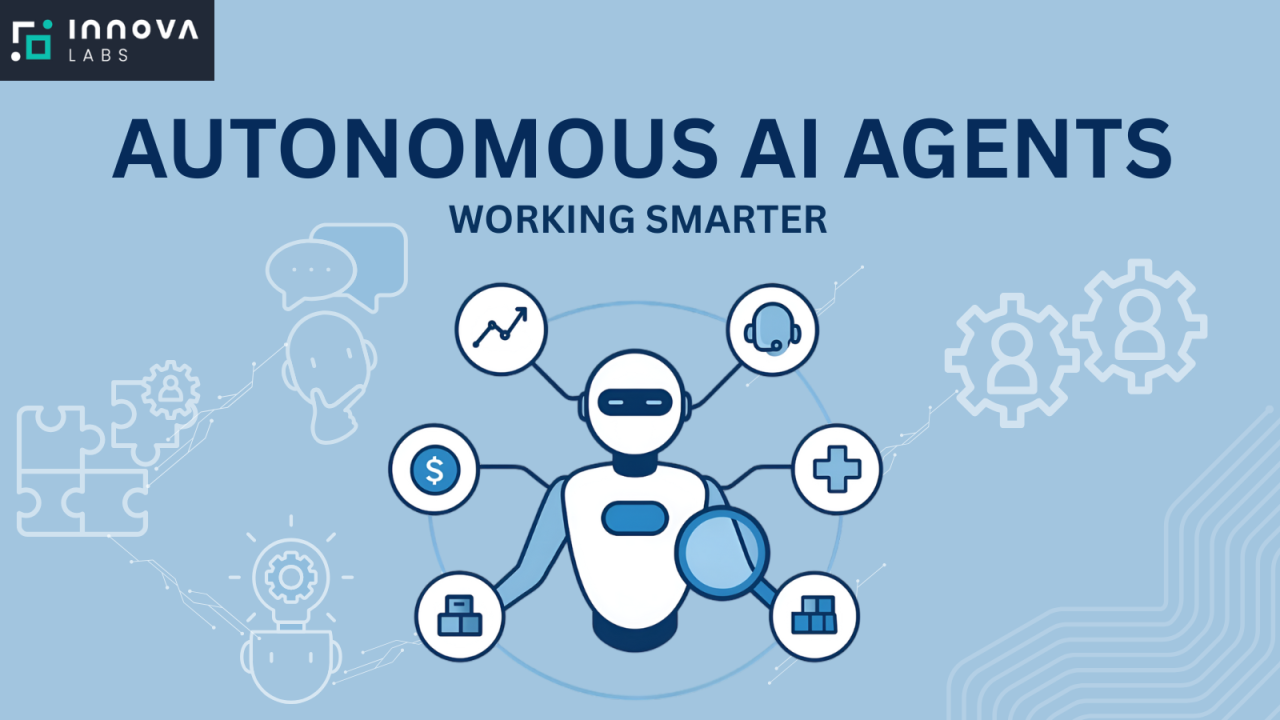How AI is Revolutionizing Healthcare in 2025
Table of Contents
-
Introduction
-
The Rise of AI in Healthcare
-
Key AI Applications in 2025
-
AI in Diagnostics
-
AI in Drug Discovery
-
AI in Personalized Treatment
-
AI-Powered Virtual Health Assistants
-
Robotic Surgery & Automation
-
-
AI in Medical Imaging
-
Real-Time Monitoring & Wearables
-
Mental Health and AI
-
Benefits of AI in Healthcare
-
Challenges & Ethical Considerations
-
The Future of AI in Healthcare
-
Conclusion
-
FAQs
1. Introduction
Artificial Intelligence (AI) is no longer a buzzword—it’s a practical force transforming industries. In 2025, one of the most profound impacts of AI is in healthcare. From improving diagnostic accuracy to personalizing treatment plans, AI is playing a pivotal role in making healthcare faster, smarter, and more accessible.
2. The Rise of AI in Healthcare
The global healthcare system faces numerous challenges: doctor shortages, rising patient demands, and complex data overload. AI technologies—especially machine learning, natural language processing (NLP), and computer vision—are helping bridge these gaps by automating repetitive tasks, predicting patient outcomes, and supporting clinical decisions.
In 2025, AI is not only assisting healthcare professionals but also empowering patients to take control of their own health with smart apps, wearables, and remote monitoring tools.
3. Key AI Applications in 2025
a) AI in Diagnostics
AI has become a powerful diagnostic ally. By analyzing large sets of patient data, radiology scans, and genomic information, AI models can detect diseases like cancer, diabetes, and cardiovascular conditions at earlier stages.
For example:
-
Google’s DeepMind detects over 50 eye diseases with 94% accuracy.
-
PathAI assists pathologists in diagnosing cancers by reducing human error.
b) AI in Drug Discovery
Traditional drug discovery can take 10–15 years and billions in cost. In 2025, AI is reducing this cycle to under 2–3 years in some cases by:
-
Predicting molecular behavior
-
Identifying viable drug candidates
-
Running simulations instead of clinical trials
Companies like Insilico Medicine and Atomwise are using AI for faster, cheaper drug development.
c) AI in Personalized Treatment
AI customizes treatment plans based on:
-
Genetic profiles
-
Lifestyle data
-
Real-time vitals
This personalized medicine reduces adverse drug reactions and boosts recovery rates. Platforms like IBM Watson Health analyze patient records to recommend personalized therapies in seconds.
d) AI-Powered Virtual Health Assistants
AI chatbots and virtual nurses like Sensely, Buoy Health, and Ada Health are guiding patients in:
-
Symptom checking
-
Medication reminders
-
Appointment scheduling
-
Mental health support
These tools free up human resources and allow 24/7 patient support.
e) Robotic Surgery & Automation
AI-enhanced surgical robots like da Vinci Surgical System are offering minimally invasive surgeries with:
-
Greater precision
-
Reduced recovery time
-
Lower infection rates
In 2025, AI is also streamlining hospital administration, automating everything from patient records to billing.
4. AI in Medical Imaging
AI is transforming medical imaging by:
-
Enhancing MRI, CT scans, and X-rays
-
Spotting abnormalities human eyes miss
-
Speeding up image analysis
Tools like Zebra Medical Vision and Aidoc use deep learning to detect:
-
Brain hemorrhages
-
Lung infections
-
Bone fractures
-
Tumors
Doctors are using AI-powered imaging as a second opinion to ensure higher diagnostic accuracy.
5. Real-Time Monitoring & Wearables
With devices like Apple Watch, Fitbit, Oura Ring, and AI-integrated smart patches, healthcare providers can now:
-
Monitor heart rate
-
Detect arrhythmias
-
Track sleep cycles
-
Send real-time alerts for anomalies
AI algorithms in 2025 are also predicting epileptic seizures or cardiac arrest before they happen, improving chances of timely intervention.
6. Mental Health and AI
Mental health has gained priority, and AI is playing a significant role in offering accessible solutions through:
-
AI chatbots like Woebot for CBT (Cognitive Behavioral Therapy)
-
Emotion AI that detects stress through voice tone, facial expressions, and text
-
Predictive analytics to spot mental health relapses
AI also assists therapists by summarizing session notes, analyzing sentiment trends, and suggesting treatment modifications.
7. Benefits of AI in Healthcare
-
Improved accuracy in diagnosis and treatment
-
Faster clinical decisions with predictive models
-
Reduced healthcare costs via automation
-
Enhanced patient engagement through mobile health apps
-
Personalized care based on individual data
-
Scalability: AI handles vast datasets humans can’t
In rural or underserved areas, AI bridges the gap by providing virtual consultations and diagnostics where no doctors are available.
8. Challenges & Ethical Considerations
Despite its promise, AI in healthcare faces serious concerns:
-
Data privacy: Medical records are sensitive.
-
Bias in training data: AI must be trained on diverse datasets to avoid inequality.
-
Accountability: Who is responsible if AI makes a wrong diagnosis?
-
Over-dependence: Doctors must remain in control, not AI.
In 2025, strict regulatory frameworks like HIPAA, GDPR, and AI ethics boards ensure safer and more reliable AI integration.
9. The Future of AI in Healthcare
By 2030, experts predict AI could:
-
Replace 30% of administrative roles in hospitals
-
Reduce diagnostic errors by 50%
-
Enable fully autonomous surgical procedures in certain disciplines
-
Launch AI-driven remote hospitals in low-income regions
Research is also advancing toward brain-computer interfaces (BCIs) for neurodegenerative diseases and nanobot AI for cellular-level treatment.
10. Conclusion
AI is not replacing doctors but enhancing their capabilities. In 2025, the synergy between human intelligence and artificial intelligence is saving lives, cutting costs, and making healthcare more proactive than ever.
As we step deeper into the digital age, embracing AI in healthcare is no longer optional—it’s essential for progress, precision, and personalization.
11. FAQs
Q1: Is AI replacing doctors in 2025?
No. AI supports doctors with faster diagnostics and data analysis but doesn’t replace human expertise.
Q2: Are AI health tools safe and accurate?
Many AI tools exceed 90–95% accuracy but must be approved by regulatory bodies and used under supervision.
Q3: What are some good AI apps for patients?
Ada, Babylon Health, Buoy, and Youper are popular AI apps for symptom checking and mental health.
Q4: Can AI help in emergency situations?
Yes, AI can predict cardiac events or detect strokes early, helping patients get immediate care.
Q5: Will AI reduce healthcare costs?
By automating tasks and improving efficiency, AI is significantly cutting operational costs in hospitals.
Advanced Trends & Real-World Innovations in AI-Driven Healthcare
🏥 AI-Run Clinics & Virtual Health Delivery
In England, the NHS launched its inaugural AI-run physiotherapy clinic in Cambridgeshire and Peterborough, called Flok Health, in early 2025. Over a 12-week pilot involving 2,500 patients, this AI-powered system used video-based automated assessments to facilitate same-day digital physiotherapy. Results included:
-
44% reduction in musculoskeletal waiting times
-
55% decrease in back pain–specific waitlists
-
856 clinician hours saved monthly WIREDGitnux+3The Guardian+3Gitnux+3
Such implementations highlight AI’s ability to scale healthcare access quickly, especially amid clinician shortages.
🧠 Digital Twins for Personalized Surgical Planning
At SGPGI in India, neurosurgeon Prof. KR Balakrishnan uses AI-powered digital twin technology to model patient-specific responses to surgical procedures. By simulating outcomes based on real-time hemodynamic data, clinicians can choose the safest, most effective treatment—reducing surgical risk and human error. This is especially impactful in resource-constrained settings. The Times of India
🤖 Exoskeletons Helping Patients Walk Again
French startup Wandercraft in partnership with Nvidia and AWS is advancing wearable robotics for mobility restoration. Its Atalante Eve exoskeleton, currently in clinical trials in the U.S., helps paralyzed individuals walk using self-balancing AI systems that respond in real time. With possible Medicare reimbursement and reduced manufacturing costs, these devices could become a common assistive technology. New York Post
🤝 Voice AI for Healthcare Admin & Emotional Support
Voice AI solutions like Eva by Cencora automate insurance and patient communication, replacing hundreds of staff hours and dramatically speeding up responses. Meanwhile, AI companions like Everfriends, powered by emotion-detection models, are supporting elderly or socially isolated patients by offering companionship and conversational support. businessinsider.com
🧬 AI Virtual Labs & Drug Innovation
Researchers at Stanford have developed AI scientist agents that mimic human lab teams. In a recent study, these agents independently proposed using nanobodies to enhance COVID vaccine stability—achieving better modeling outcomes with minimal human oversight. reuters.com
🩺 AI Triage & Diagnostic Assistants for Patient Self-Care
AI-based platforms like Doctronic now offer free, anonymous online consultations. In just 15–20 minutes, patients receive up to four potential diagnoses with SOAP-note summaries, backed by licensed physicians if needed. Doctronic has supported over 10 million consultations with around 70% accuracy, providing critical access to basic care. New York Post
📊 AI in Healthcare—Key Industry Statistics (2025)
-
85% of clinical trials are delayed due to recruitment issues; AI now optimizes matching, boosting speed by ~50% wifitalents.com
-
AI diagnostics accuracy exceeds 95% in some applications; medical imaging tasks are over 60% automated in major hospitals wifitalents.comGitnux
-
AI-driven patient monitoring lowers hospital stays by 3 days and emergency readmissions by 12–15% wifitalents.com
-
70% of healthcare orgs now use or plan to implement AI by 2025, improving operational efficiency by ~25% wifitalents.com
-
The AI in healthcare market is projected to hit $45.2 billion by 2026 with growth continuing through 2030 to an estimated $188 billion Gitnux+4Dialog Health+4zipdo.co+4
-
Virtual health assistants handle 60% of routine inquiries, saving billions globally openandaffordable.com+4Gitnux+4wifitalents.com+4
-
AI surgical robotics reduce post-op complications by 20%, shortening surgical times by 15–25% sci-tech-today.com
🧾 Additional Use Cases & Pioneering Solutions
AI Medical Scribes
Heidi Health, based in Melbourne, automates clinical documentation by transcribing consultations into medical notes, referral letters, discharge summaries, task lists, and more using LLMs. With over 2 million interactions per week and fresh funding, it’s rolling out globally to reduce physician documentation burdens. en.wikipedia.org
Elder Care with Robotics
Robots and AI are beginning to support elderly populations in nursing homes. In facilities like the MIT EBAR prototype, humanoid robots assist with daily routines, while AI wristbands monitor vitals and alert staff in case of emergencies—improving both safety and emotional well-being. marketwatch.com
Combating Long Covid & Chronic Illness
A Duke University–Jackson Lab study used AI to analyze data from chronic fatigue syndrome and long Covid patients, detecting the condition with 90% accuracy by examining microbiome and metabolic markers. This approach brings hope for diagnosing diseases previously considered elusive. ft.com
✅ Expanded Benefits of AI in Healthcare
Predictive Analytics & Early Detection
AI can forecast patient deterioration up to 48 hours in advance with data accuracy around 85–90%, enabling early interventions before conditions worsen. zipdo.co+2wifitalents.com+2zipdo.co+2
Streamlined Clinical Workflows
Administrative AI tools reduce documentation time by 50%, improve medical coding accuracy by 98%, and free up clinicians to focus on patient care. GitnuxGitnux
Democratizing Healthcare Access
AI chatbots and telemedicine platforms are extending reach to underserved regions, reducing clinician workloads and expanding access by up to 40% in rural areas. forbes.comGitnux
Cost Savings & Economic Impact
By enhancing diagnostic accuracy and improving efficiency, AI is saving the healthcare sector $13 billion by 2025 and is projected to save $150 billion annually by 2026. Dialog Healthopenandaffordable.comGitnux
🧭 Ethical & Regulatory Considerations
Despite its benefits, AI in healthcare raises concerns:
-
Data Privacy & Ownership: Proposed U.S. initiatives to share patient records across Apple, Google, and OpenAI raise privacy risks—highlighting the need for robust HIPAA safeguards. time.com
-
Bias & Equity: If trained on non-representative data, AI may perpetuate healthcare disparities.
-
Liability & Trust: Determining responsibility when AI-powered tools err remains a legal and practical challenge.
-
Human Oversight: Tools must support—not replace—clinical judgement and empathy.
Rigorous standards such as FDA approvals, GDPR, and institutional ethics boards guide safe implementation.
🚀 What’s Next for AI in Healthcare?
Looking forward to 2030 and beyond:
-
AI-powered robotic caregivers and virtual hospitals, especially in aging populations
-
Nano-scale diagnostics, possibly using AI-enabled nanobots for early disease detection
-
Immersive XR therapies, like VR exposures that enhance immune or neurological training
-
Integrated AI health ecosystems, where wearable sensors, predictive models, and telehealth systems share real-time insights across devices
-
Generative AI in healthcare education, training clinicians to use AI tools safely and ethically
🔚 Conclusion
In 2025, AI is no longer just an emerging technology—it’s deeply embedded in healthcare systems worldwide. From improving diagnostics and cutting wait times to empowering patients and reducing costs, the impact is transformative.
However, human expertise remains central. AI enhances healthcare professionalism—it doesn’t replace it. With proper regulation, transparency, and continuous medical oversight, AI-driven healthcare can fulfill its potential: more equitable, efficient, and effective global care.
✅ FAQs:
Q1. How is AI used in healthcare in 2025?
A: AI is being used in diagnostics, robotic surgeries, patient data analysis, drug discovery, virtual health assistants, remote patient monitoring, and personalized treatment planning.
Q2. What are the benefits of AI in medicine?
A: AI improves diagnostic accuracy, speeds up treatment decisions, enhances patient monitoring, reduces human error, and allows for more personalized healthcare experiences.
Q3. Are AI-powered tools replacing doctors?
A: No, AI tools support doctors by automating routine tasks and offering insights. The final decisions and empathy-driven care still require human expertise.
Q4. What are some popular AI tools in healthcare today?
A: Notable tools include IBM Watson Health, Google DeepMind for eye disease detection, PathAI for pathology, Aidoc for medical imaging, and Tempus for cancer care analytics.
Q5. Is AI in healthcare safe and ethical?
A: When regulated properly, AI in healthcare is safe. However, ethical concerns around bias, data privacy, and transparency must be addressed to ensure equitable care.
Q6. How does AI help in early disease detection?
A: AI can analyze medical images and patient history to detect signs of diseases like cancer, diabetes, and Alzheimer’s far earlier than traditional methods.
Q7. Will AI reduce healthcare costs in the future?
A: Yes. By automating tasks, improving diagnostics, and reducing hospital readmissions, AI helps cut down costs significantly while enhancing care quality.
AI in Recruitment and HR: Revolutionizing Talent Acquisition in 2025 (benefits of using AI in HR)
AI in Culinary Arts: How Artificial Intelligence Is Revolutionizing the Kitchen






